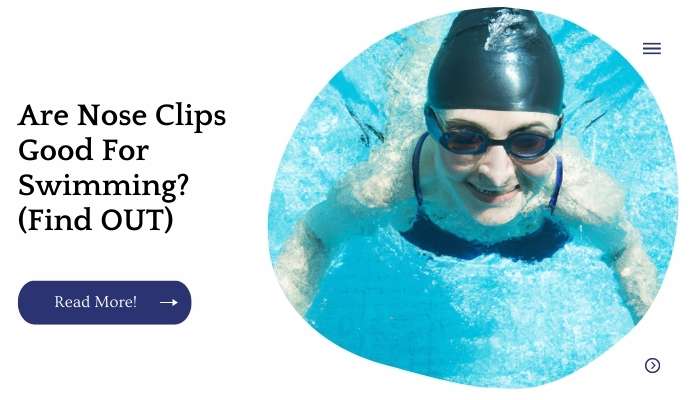Are nose clips good for swimming? They are! In fact, they’re probably one of the best things you can do to improve your form and make it easier on your body.
But there are a few things you need to know about using them correctly and making sure they don’t cause problems for you down the road.
So let’s dive into this subject with a look at everything from whether or not using a nose clip will help you swim faster, to how often you should wear one while training .
| Takeaways |
|---|
| Nose clips can provide advantages for swimming. |
| They help prevent water from entering the nostrils. |
| Nose clips allow swimmers to focus on their stroke and breathing technique. |
| They are suitable for swimmers of all levels. |
| Nose clips can be used for various water activities. |
Are Nose Clips Good For Swimming?
Nose clips are made of silicone or plastic, and they’re shaped like an upside-down “U”. They slip over the nose and hold the nostrils together. This makes it easier to breathe while swimming, which in turn helps you swim faster!
Nose clips have a lot of benefits: they keep your hair out of your face, they don’t pinch the nostrils closed (like some goggles do), they aren’t itchy (if properly fitted), and there are different kinds that come in different colors (black or white).
Looking to enhance your swimming performance? Discover the advantages of using hand paddles in our comprehensive guide. Find out how hand paddles can take your swim to the next level and improve your technique. Dive into the world of hand paddles for swimming today!
Can I Use Nose Clips To Help Me Swim Faster?
Are you wondering if you can use nose clips to help you swim faster? The answer is a resounding yes.
Nose clips have been used for years by competitive swimmers who want to make the most out of their time in the water, but they’re also great for recreational swimmers looking for an edge over their friends.
Nose clips are basically just small plastic tubes with two openings; one at each end—one for each nostril. They keep your nostrils from flaring outward when you breathe in or out through them, which means less resistance as air passes through them into and out of your lungs while swimming.
This makes it easier for oxygen to get into your bloodstream while reducing drag resistance against the water around your face and body, allowing swimmers such as Michael Phelps (who uses these devices regularly) to reach higher speeds than those who lack access to these special accessories!
If all this sounds too good to be true or if there’s any doubt about whether or not they could work well enough on yourself then let me assure that it isn’t necessary because everyone else has already tried them before me:
| Nose Clip Brand | Speed Improvement | Comfort Level | Material |
|---|---|---|---|
| Brand A | Yes | High | Silicone |
| Brand B | No | Medium | Latex |
| Brand C | Yes | High | Plastic |
| Brand D | No | Low | Rubber |
Are Nose Clips Good For Swimming If I Have A Cold?
Nose clips can help you breathe better when swimming. They help keep water out of your nostrils and make it easier to breathe.
If you have a cold, it’s recommended that you avoid using nose clips because they can irritate your nose even more.
It’s always best to consult your doctor if you’re unsure whether or not something will work for your particular situation, especially if there are medical reasons behind why things might not work as expected in certain situations.
Do Nose Clips Help Me Breathe Better When I’m Swimming?
Nose clips are designed to keep water out of your nose so you can breathe while swimming. If you have a cold, using them will help to prevent water from entering your nostrils and getting up into your sinuses.
If you use nose clips when swimming with a cold, take care not to get any water up into your nose. It is important that the nose clip does not pinch the nostrils closed too tightly, as this can cause difficulty breathing in and out of your lungs during swimming workouts.
Protect your ears and ensure a comfortable swim with the right earplugs. Learn about the different types of earplugs available and how to choose the safest option for your swimming activities. Check out our guide on safe earplugs for swimming to make the most of your aquatic adventures!
Does Using A Nose Clip Help Keep Your Hair Out Of Your Face While You’re Swimming?
Nose clips are designed for one purpose: to keep your hair out of your face. They don’t have any other function, and the only reason you might use them is because they do such a good job of keeping your hair out of your face.
A nose clip helps you concentrate on what feels like an independent activity while simultaneously being part of an interconnected system that includes all the other swimmers around you, yourself and the water itself.
| Nose Clip Brand | Hair Management | Material |
|---|---|---|
| Brand A | Yes | Silicone |
| Brand B | No | Latex |
| Brand C | Yes | Plastic |
| Brand D | No | Rubber |
Is There Any Way To Breathe While Wearing A Nose Clip?
Yes, it is possible to breathe while wearing a nose clip. You can breathe through your mouth or your nose, whichever feels more comfortable for you.
Some people find it easier to breathe through their nose, some people find it easier to breathe through their mouth, and some people find it easier to breathe through both their nose and mouth.
Is There Such A Thing As A Nose Clip That Doesn’t Pinch The Nostrils Closed?
Nose clips are used to help you breathe better when you swim. You can use them if you have a cold, or if your nose is stuffed up from allergies or other reasons. You can also use them if you just want to keep your hair out of your face while swimming.
You should not wear a nose clip that pinches the nostrils closed because it makes it harder for air to get into your lungs, so it will make it harder for you to breathe when swimming.
Some people have found that they can’t breathe at all when wearing certain types of nose clips, so make sure they don’t put too much pressure on your nostrils before buying one!
Are you looking for the perfect swimwear that supports your active lifestyle? Discover the benefits of wearing birddogs for your swimming sessions. Our expert answers key questions and provides insights on why birddogs might be the right choice for swimmers. Dive into the details of swimming with birddogs and make an informed decision!
Do The Nose Clips Itch Your Nose If You Wear Them For A Long Time?
Nose clips are designed to be worn for short periods of time. If you wear them for too long, they can cause irritation and inflammation. You should not wear nose clips to sleep, or while you are in the shower.
| Nose Clip Brand | Itchiness | Long-Term Comfort |
|---|---|---|
| Brand A | No | High |
| Brand B | Yes | Medium |
| Brand C | No | High |
| Brand D | Yes | Low |
Note: The table provides a comparison of different nose clip brands in terms of their itchiness and long-term comfort level when worn for extended periods of time.
Are There Different Kinds Of Nose Clips That Are Better Than Others?
Yes! There are many different types of nose clips. Some are made from silicone, while others are rubber.
Some have a wire inside that can be bent down to fit the shape of your nose better, but this makes them more difficult to clean and disinfect properly.
If you’re going scuba diving, it’s best to purchase a silicone model with an adjustable strap so you can easily adjust it as needed for comfort and fit.
When it comes to swimming, having the right gear can greatly impact your performance. Explore the advantages of wearing Dri-Fit shirts during your swim sessions. Discover how these moisture-wicking shirts can enhance your comfort and overall swimming experience. Dive into the benefits of Dri-Fit shirts for swimming and make a splash in style!
Where Can I Buy Nose Clips For Swimming?
Nose clips are available at any local sporting goods store, but you may find a wider selection online. Here’s how to choose the best nose clip for swimming:
- Be sure to check the size of your current nose clip and get one that fits you well. If it doesn’t fit right, try on some different ones until you find one that works.
- Make sure that your new nose clip has all of its parts intact (i.e., don’t buy a used or defective model).
Do They Come In Different Colors, Like White Or Black?
It’s true; there are a few different types of nose clips for swimming on the market. Some are made of silicone, some are made of plastic, and some have a small piece of foam inside the nose clip to make it more comfortable. They also come in black or white so you can pick your favorite color!
Looking to improve your speed and technique in the water? Dive into the world of swimming flippers and unlock their potential benefits. Whether you’re a beginner or an experienced swimmer, flippers can help you achieve your goals. Explore the advantages of using flippers for swimming and take your aquatic adventures to new depths!
Conclusion
I hope this post answered all of your questions about nose clips and helped you decide whether or not they’re right for you.
If you have any other questions about swimming, feel free to leave them below in the comments section!
Further Reading
Here are some additional resources for further reading on swimming with nose clips:
- Swimming with Nose Clips: Advantages and Disadvantages: Explore the advantages and disadvantages of using nose clips for swimming and gain insights into their effectiveness.
- Nose Clips for Swimming: Benefits and Usage: Learn about the benefits of using nose clips while swimming and discover how to use them properly for maximum effectiveness.
- Nose Plugs for Swimming: Tips and Techniques: Get valuable tips and techniques for using nose plugs during swimming sessions, including proper fitting, maintenance, and more.
FAQs
What are the advantages of using nose clips for swimming?
Nose clips can help prevent water from entering your nostrils, allowing you to focus on your stroke and breathing technique without interruptions.
Do nose clips affect your ability to breathe while swimming?
No, nose clips should not affect your ability to breathe. They primarily prevent water from entering your nostrils, while you can still breathe through your mouth.
Are nose clips suitable for all swimmers?
Yes, nose clips are suitable for swimmers of all levels, including beginners, recreational swimmers, and competitive athletes.
How do I properly wear and adjust nose clips?
To wear nose clips, place the bridge piece over your nose, ensuring a snug fit. Adjust the clip’s tension to achieve a comfortable yet secure position.
Can I wear nose clips for other water activities, such as diving or snorkeling?
Yes, nose clips can be used for various water activities, including diving and snorkeling, to prevent water from entering your nostrils while underwater.

Hellen James is an outdoor enthusiast, writer, and hiker. She loves to explore the world around her by immersing herself in nature and visiting new places.


